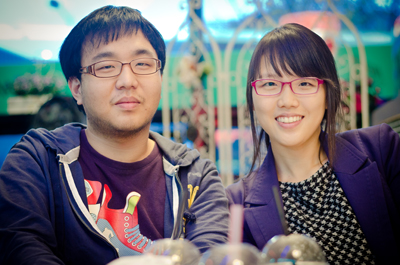Four KAIST students, Jae Hoon Kim, Ji Na Kim, Joo Man Kim, and Ye Won Yeo are preparing to start up a business enterprise named SumKwang, meaning "serving light" in Korean, to help out energy for the poor by developing a low cost solar heater. Ji Na Kim and Joo Man Kim participated in the interview.

How did you start the project?
[J. N. Kim] We had the opportunity to attend a seminar related to social enterprise last fall. We met each other there - all of us were in the same club, IVF, before - and found out that we had the same interests related to social enterprise. Since the seminar had a contest, we made a team of four and were awarded first place with five million Korean Won as the prize. The seed funding for the inauguration of this enterprise was initially five million Korean Won and so we received ten million Korean Won in total for the starting up of our business.
Could you explain any difficulties that you experienced?
[J. N. Kim] We are currently preparing to start our business. Since it has taken us a long time to prepare there has not been any clear achievement or failure. However, developing our ideas was a difficult task. This is because in this step, while our target group is the societal minorities and the poor we are engineering students studying high technology. Therefore the solutions we could think of required a large budget and were difficult for actual application. Subsequently the most difficult task for us was finding appropriate and economically feasible technology. As well, starting up a business after deciding which ideas to develop was challenging because we did not know how to write business contracts. On top of this, we did not know where to start. Recently, we are finding that we do not have much economic power and since we have to make our own products it is difficult to find a working place for its manufacture. To overcome these difficulties we applied to several youth support programs such as Creative Campus and the Prospective Engineer Fostering Program. We also are receiving assistance from professor Joo Sung Lee of the KAIST Graduate School of Innovation and Technology Development.
What are your plans for the Future?
[J. N. Kim] We are currently developing a material to economically store heat. We made the main body last summer. Now we are focusing on a heat medium to be put inside the body; our short-term plan is to install our product in a reception room at a welfare center in Daejeon by this winter. We received permission to do so as a demonstration and obtain necessary data during the winter. In the long-term, we want the product to be used not only by the energy poor but also in rural and farming areas. In fact, as engineering students, we think that helping out with the current energy crisis is one of the best and most reasonable social problems for us to solve.
Would you like to say anything to the readers?
[J. M. Kim] KAIST students are intelligent and definitely capable of helping society. I wish students would look for such opportunities themselves. Here on campus, it is easy to forget how much help you could be to others, I hope students would reach out to the underprivileged and experience more of the life outside KAIST. It would remind students of their responsibilities as intellectuals. I have the belief that basic standards of living should be fulfilled for everyone, but society cares too little.
Ji Na Kim: I believe that a small change in the world can make someone's life meaningful. When I was young, my cousin fell into a rectangular manhole. After a while, manholes became circular. Though the change in shape was rather minor, it probably affected the lives of numerous people and families. I wish more people would think that such small changes are possible are within their capabilities.
Yoo Hee Kang
yoohee1222@kaist.ac.kr

